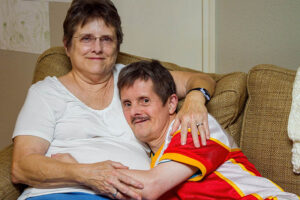A direct support professional provides a very necessary service for people with physical or cognitive disabilities.
A DSP (direct support professional) might assist with anything from transportation to socialization to personal care and housekeeping. In general, a direct support professional helps improve the overall quality of life of the people that they are assisting. Being a DSP can be both challenging and rewarding and encompass a wide range of responsibilities.
A direct support professional might, on a daily basis, provide any of the following services:
- Provide supervision and guidance during daily activities
- Develop and implement treatment programs
- Administer prescribed medications to patients
- Train patients in the development of certain skills such as housekeeping, money management, and social and behavioral skills
- Develop a relationship with residents that will result in both trust and support
- Provide feedback regarding a resident’s progress of various skills and activities
- Update case notes on a daily basis
In general, a good DSP will have certain qualities that allow them to perform their duties effectively.
Patience and understanding are two of the cornerstones of a good DSP. They must also be able to deal with a wide range of people regardless of their culture, religion, age, or background.
DSPs must also be computer literate and be able to provide administrative skills. Because the physical and cognitive level of the patients may vary a great deal from person to person, it is necessary for a DSP to be flexible and be able to deal with many different personalities.
Direct support professionals should have a high school diploma, but are often times hired if they demonstrate the ability to read and write at at least an 8th grade level. The completion of a training program is also necessary and must be done with 120 days of a DSP’s hiring date.
The curriculum for the training is provide by the National Alliance for Direct Support Professionals, and covers a wide range of subjects. Upon completion of the program, students are issued certification showing that they have the necessary skills to be a successful direct support professional.

Assisted Living
Direct support professionals will most of the time work a 40-hour week, but many times put in over time as the situation dictates. They generally also need to be available for weekends and holidays. DSP jobs exist everywhere from government institutions, hospitals, children’s care centers, hostels, and senior care centers.
On the average, DSP’s earn around $11-$15/hour, so becoming a DSP is something that you do because you are passionate about it, not because of the large wages that are available. More experienced DSP’s earn more money and it is not uncommon for a DSP who has spent ten or more years in the industry to earn in the neighborhood of $40-$50,000 per year.
The employment rate for DSPs is increasing all the time and is expected to jump as much as 26% over the next ten years, owing to the ever increasing amount of baby-boomers who are in need of assistance.
For more information on Direct Support Professional positions open at RSS in Billings, MT, check out our Employment Opportunities.








